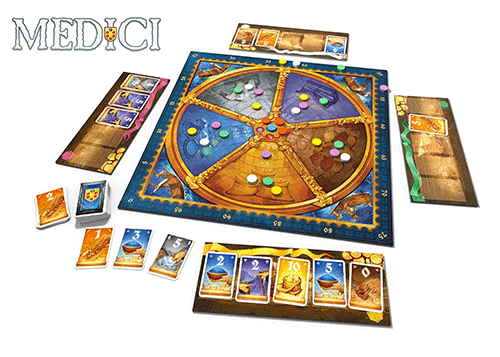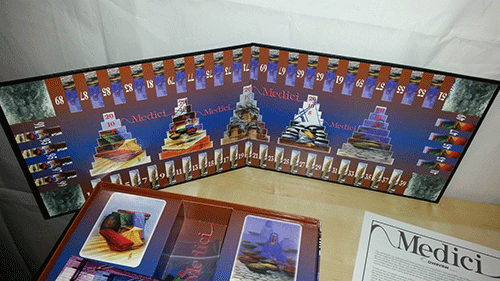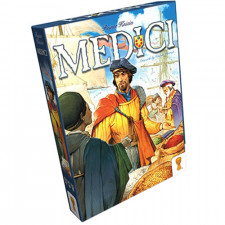Medici Review
on Oct 4, 2016
Medici was one of those games in the mid to late 1990s that made people in the US look to Germany for more great, accessible games with “clever†mechanics in the wake of Settlers of Catan. The early editions of the game were horrendously ugly but now Grail Games has released an excellent update of this classic Reiner Knizia auction game with illustrations and colors that aren’t an eyesore, for a change. It’s also an inexpensive title, which is particularly welcome in the wake of the grossly overpriced Wind Rider reprint of Ra that came out earlier this year.

A lovely new edition of a lovely old game.
Along with Ra and the seminal Modern Art, Medici forms a sort of “auction trilogy†in the Knizia canon. Most players and Kniziaphiles would be quick to name Ra or Modern Art the best of the three but I am of the opinion that these three games are really just about equal in terms of quality but each has a few distinguishing characteristics that set it apart. Medici feels like the most approachable and most easily apprehended of the lot. Its mechanics are extremely simple, the scoring is easy to grasp, and the gameplay concepts make immediate sense upon explanation. Classic Knizia themes abound – choosing which battles to fight with very limited resources, determining how much you are willing to suffer to get what you want, development across multiple vectors, and mitigating setbacks are all key ingredients here.
Like a lot of 1990s-era Knizia, the game is very Sacksonian in its design. There is a core mechanic around which the process is constructed and then a simple resolution method to determine values and rewards. On your turn, you reveal crates depicting five different types of goods one at a time. Each of these goods also has a value from one to five. At any point, until you reach a maximum of three, you can call for a once-around-the-table auction of the lot. The winner pays up and loads the goods onto his or her ship, which has just five slots in its hold. Once everyone’s ships are full, the day’s trading ends and whoever has the most valuable ship (meaning the sum of their goods is the highest) gets a cash reward as well as some of the runners-up, depending on how many are playing. Then, each player unloads their ship and advances a marker along a chart showing how much of each good they’ve transported, one space per good regardless of value. Whoever has the highest rank gets 10 florins, second five. And there are also bonuses for reaching the top spots.

Now, for contrast, here is the hideous 1995 Rio Grande Games edition- a total eyesore, and thankfully NOT the edition that this review is concerned with.
Now, this is all quite simple stuff- auctions with majorities, really. Where it gets really interesting is in the valuation of the lots. You might find yourself angling to get a corner on the corn market with a lot offering two units of it, but with a third commodity that you don’t want but have to take as part of the deal. Or, the corn might be of low value, meaning that you might have to forgo a chance at the most valuable ship award to get ahead in the marketplace. And then there is a special treasure card that comes up that is worth 10 points towards that most valuable ship award. Is it worth taking on two other goods that you have no interest in to claim it?
This goes on for three “days†and takes only about 30 minutes to play. And you can satisfyingly play two to six with it, so player count is versatile and its accessibility makes it easy to table with any group. The bidding wars can be fierce, but the game never feels heavy or processional at all. It’s one of those classic German-style family games that delights with its simplicity, but compels with its subtle depth. I’ve played this game with a wide range of groups and player types, and it never seems to fail to find its mark. It’s a true classic, and as a huge Knizia fan I couldn’t be more pleased to see it back in print and in the best edition that it has ever seen.

 Customer Support
Customer Support  Subscribe
Subscribe 




 Account
Account  Wishlist
Wishlist 

